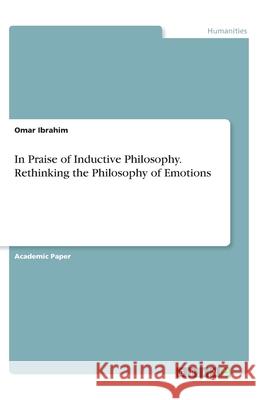In Praise of Inductive Philosophy. Rethinking the Philosophy of Emotions » książka
In Praise of Inductive Philosophy. Rethinking the Philosophy of Emotions
ISBN-13: 9783346108180 / Angielski / Miękka / 2020 / 20 str.
Academic Paper from the year 2019 in the subject Philosophy - Theoretical (Realisation, Science, Logic, Language), grade: 5.5, University of Bern (Institut für Philosophie), course: Emotion, language: English, abstract: The present study deals with the philosophy of emotions. In a brief discourse overview, the different positions are presented and their problems are examined. Subsequently, a new method is presented of how emotions can be investigated within the analytical tradition. In doing so, an attempt is made to build a bridge to the continental tradition and to integrate the latest findings from complexity research and the philosophy of language.Do human emotions exist and what is the nature of their existence? In view of these two questions, contemporary philosophical debates on human emotions attempt to provide different answers. Mostly we find two prominently represented positions, which, however, cannot produce satisfactory answers at all. The first position, as I will call it in this paper, is the one of the deductionists. These scientists, psychologists and philosophers bring out a positive answer to the two questions presented above. They claim that human emotions really exist, in one way or another, and that they have a specific nature so that we can decipher and analyze them. A very famous example of this is Ekman's basic emotion theory, which presents a categorized system of six to seven basic emotions and describes their bio-psychological function. In the focus of the nature of emotions (what makes something an emotion?) we find other relevant theories such as Nussbaum, James or Prinz. All of them claim in different ways what constitutes the essence of an emotion. For example, emotions could be cognitive judgments of values, or perceptions of bodily changes, or even perceptions of value attributes themselves. Despite of all the differences, all these theories share one thing in common. All of them believe that only one deducible theory of emotions is sufficient to explain their nature in all its complexity and precariousness. The fact that the deductionists face serious problems can be seen from the current philosophical discourse alone.











